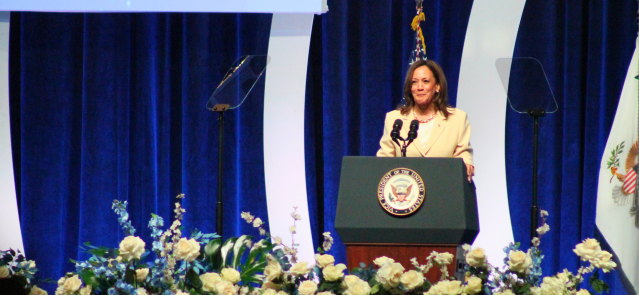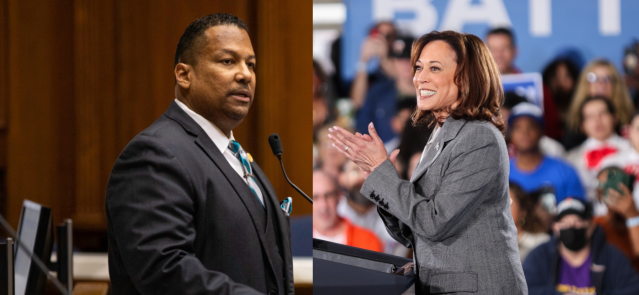Stay ahead of the curve as a political insider with deep policy analysis, daily briefings and policy-shaping tools.
Request a DemoRepublican push would strictly limit public access counselor’s review authority

Sen. Aaron Freeman, R-Indianapolis, speaks during an Appropriations Committee meeting in February 2024. (Credit: Mark Curry)
The scope of what Indiana’s public access counselor could consider in reviewing open government matters would be strictly limited under provisions added to legislation in the closing days of the legislative session.
Amendments that a Senate committee made this week to House Bill 1338 would also reduce the office’s independence by eliminating the four-year term the access counselor has after being appointed by the governor.
The Legislature in 1999 established the access counselor position to review questions from the public, government officials and others about the state’s open meetings and public records laws.
The public access counselor’s office, with two attorneys and one other staff member, issues dozens of advisory opinions each year but has no authority to enforce the access laws or punish violators.
Advocate says amendment ‘guts’ counselor’s authority
Sen. Aaron Freeman, R-Indianapolis, offered the amendment allowing the access counselor’s advisory opinions to consider only “the public access laws, as plainly written,” and “valid opinions of Indiana courts.”
Freeman, chair of the Senate Corrections and Criminal Law Committee, expressed frustration with Public Access Counselor Luke Britt’s opinions without giving specifics during the Tuesday meeting when the provision was added.
“The public access counselor, it says that he, in this case, shall liberally construe the code,” Freeman said. “He’s issued some opinions that I vehemently disagree with and I think others in our body and in this building vehemently disagree with.”
The amendment “functionally guts” the access counselor’s ability to consider the context of a situation unless it has been directly addressed by the Legislature or court, said Amelia McClure, executive director of the Hoosier State Press Association.
“The code can never contemplate all of the different circumstances that public access concerns are going to arise,” McClure said. “So the public access counselor has to consider new technologies, what location, the circumstances of the conversation in a way that a civil code will never be able to contemplate.”
Britt was appointed access counselor in 2013 by then-Gov. Mike Pence and reappointed by Gov. Eric Holcomb in 2017 and 2021.

Britt, whose current term runs until Oct. 31, 2025, declined to comment to State Affairs on Freeman’s amendments. The governor’s office didn’t immediately reply Thursday to a request for comment.
The restrictions on the access counselor’s office were not raised during the first seven weeks of this year’s legislative session and became public only two days before the Senate committee’s deadline to take action.
Public access counselor’s role at issue
Some conservatives criticized an opinion Britt released last fall in which he concluded the Hamilton East Public Library Board in Fishers violated the open meetings law when two board members met with their attorneys at a coffee shop.
That opinion came amid public debate over a push by conservative members of that board to review all youth-section books and move those with “inappropriate” content to adult sections.
The opening section of Indiana’s public records law states it should be “liberally construed to implement this policy and place the burden of proof for the nondisclosure of a public record on the public agency that would deny access to the record.”
Freeman said during the committee meeting that he favored striking the “liberally construed” phrase from the law, but other senators thought that went too far.
The amendment limiting the access counselor’s authority was added to the bill on a 5-3 vote as Democratic Sen. Greg Taylor joined Freeman and other Republicans Mike Bohacek, Cyndi Carrasco and Eric Koch. Republicans Liz Brown and Sue Glick and Democrat Rodney Pol voted against the amendment.
Glick said the restriction on what the access counselor could consider didn’t make sense.
“You’re paying an attorney for their opinion, and now you’re limiting that,” Glick said.
Change would eliminate term of office
Freeman also advocated for an amendment eliminating the access counselor’s four-year term and making the position one that serves “at the pleasure of the governor.”
“When we have a new governor … I believe the governor should be able to pick the person that they’re choosing to serve,” Freeman said. “As any other appointed office, we serve at the privilege of the governor. So I believe this should be no different.”
Those people appointed to lead state departments can typically be removed at the governor’s discretion. However, hundreds of appointments to state boards and other positions, such as the state Election Division’s co-directors, are made for set terms.
McClure, the Hoosier State Press Association’s director, said eliminating the four-year term would take away some of the office’s independence from political concerns.
“That’s important when it’s an advisory opinion that’s interpreting actions of all kinds of different bodies that have all kinds of different political affiliations,” McClure said.
The full bill, which initially focused only on allowing local government boards to establish meeting decorum rules, could be taken up by the full Senate next week. The additions would still also need approval from the House before this year’s legislative session ends by March 14.
Tom Davies is a Statehouse reporter for State Affairs Pro Indiana. Reach him at [email protected] or on X at @TomDaviesIND.
X @StateAffairsIN
Facebook @stateaffairsin
Instagram @stateaffairsin
LinkedIn @stateaffairspro
4 things to know about Braun’s property tax proposal
Sen. Mike Braun, the Republican candidate for Indiana’s governor, released a plan for overhauling property taxes Friday morning that would impact millions of Hoosiers, Indiana schools and local governments. “Nothing is more important than ensuring Hoosiers can afford to live in their homes without being overburdened by rising property taxes driven by rapid inflation in …
Bureau of Motor Vehicles looks to add new rules to Indiana’s driving test
The Bureau of Motor Vehicles wants to amend Indiana’s driving skills test, putting “existing practice” into administrative rule. Indiana already fails drivers who speed, disobey traffic signals and don’t wear a seatbelt, among other violations. Yet the BMV is looking to make the state’s driving skills test more stringent. A proposed rule amendment looks to …
In Indianapolis, Harris says she’s fighting for America’s future
Vice President Kamala Harris, the presumptive Democratic presidential nominee, told a gathering of women of color in Indianapolis on Wednesday that she is fighting for America’s future. She contrasted her vision with another — one she said is “focused on the past.” “Across our nation, we are witnessing a full-on assault on hard-fought, hard-won freedoms …
Indiana Black Legislative Caucus endorses Harris, pledges future support
The Indiana Black Legislative Caucus unanimously voted Wednesday to endorse Vice President Kamala Harris’ presidential run and will look at ways to assist her candidacy, the caucus chair, state Rep. Earl Harris Jr., D-East Chicago, told State Affairs. The caucus is made up of 14 members of the Indiana General Assembly, all of whom are …




